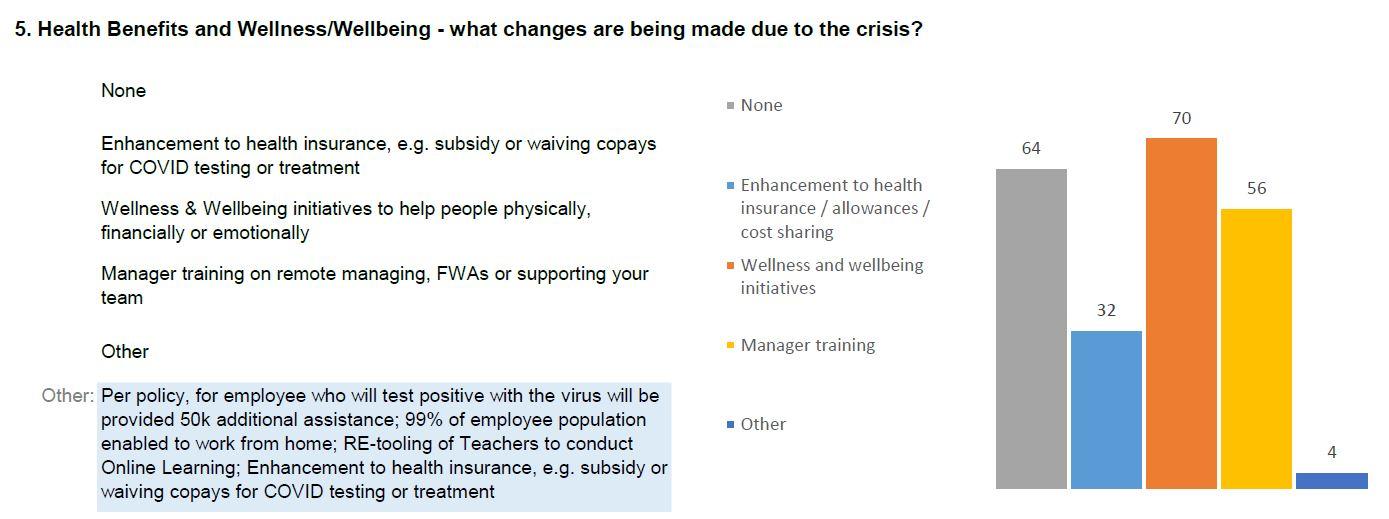share on
A survey conducted by Freelance Total Rewards has found that 75% of employers across Asia Pacific have made changes to their rewards, policies and practices in response to the COVID pandemic, beyond what was required by the government.
Tom Farmer, Owner and Managing Director of Freelance Total Rewards, explained: “In addition to work from home and distancing, employers typically took anywhere from five to 10 specific actions to manage fixed costs, protect jobs, keep people engaged, and care for their wellbeing.”
The top actions were those driven by government direction or guidelines, which were generally enacted within the survey period (mid-March through mid-May), including work from home, distancing and workspace separation.
Apart from these, the top actions taken by management in response to the pandemic are:
- Wellness and wellbeing initiatives – 33%
- Manager training on remote managing and supporting team members – 27%
- Salary reductions, usually management – 17%
- Salary freeze (e.g. no increments for any reason) – 17%
- Reduced salary increases/increments – 15%
- Enhancement to health insurance, such as subsidy or waiving co-pays for COVID testing or treatment – 15%
- Mandatory fully-paid leave – 15%
- Reduction of 2020 incentives/bonus payments – 13%
- Reduction of 2020 performance targets – 11%
- Furlough – temporary layoff with intent to call back – 10%
- Voluntary unpaid leave or reduction in hours/pay – 10%
Only responses from persons with formal responsibility, or formally in the loop on decisions, were considered for the survey, leading to a total of 211 respondents, from a wide range of industries including consumer goods, industrial and logistics, business/professional services, high-tech, banking and finance, energy & resources, life/biosciences, travel/leisure, and others. Of the 211 employers, 159 made changes in one or more of the areas listed above.

While working from home was mandatory in most countries, over 100 companies reported introducing a formal work at home policy for the first time (27%) or expanding their existing work at home policy (21%).
A large number of employers also introduced or expanded flex-time policies, to allow people to stagger their start and end times, either at home or at the office. On this, Tom shared: “People returning to the office may wish to avoid crowded trains or lifts, so flex-time is a very sensible practice going forward. When introducing flex-time, be sure meetings are scheduled within 'core hours' when everyone should be working, for example, from 10 am until 5 pm”
Other actions taken by less than 10% of respondents include:
- Mandatory reduction in workweek with proportional reduction in pay – 9%
- Reduction of 2019 bonus/incentive payments – 9%
- Redundancy/layoff – 7%
- Introduced flex-time policy for the first time – 7%
- One-time assistance payments or hardship bonuses – 7%
- Expanded existing flex-time policy – 6%
- Mandatory unpaid leave – 6%
- Mandatory reduced pay leave – 4%
The survey also found some industries taking more action than others. Industries taking the most dramatic actions include travel and leisure, energy and financial services. Those taking the least actions were high-tech, life/biosciences and consumer goods.
Lead image / 123RF
Graph / Freelance Total Rewards
share on


